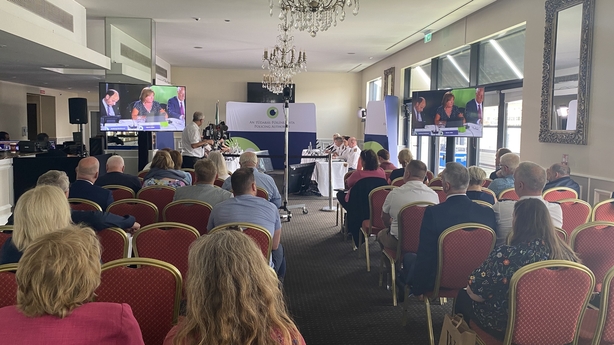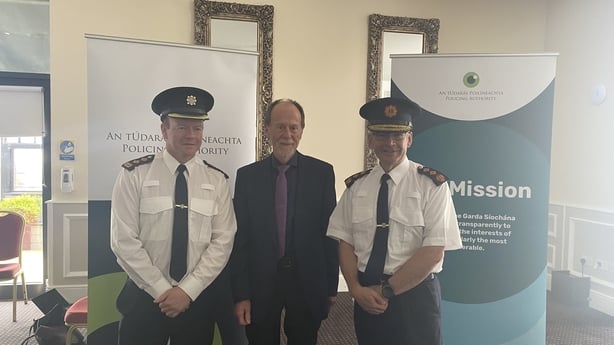The Garda Commissioner has said protests around accommodation for people seeking international protection have "eased to a good extent".
Drew Harris was speaking before a public meeting of the Policing Authority in Drogheda today.
The Commissioner told the Authority that specific policing operations were put in place in terms of individuals being able to access their accommodation, and that "by in large" was without incident.
He said there are now 50 locations in the Dublin Metropolitan Region where IPAS applicants are being housed, and that in relation to the "great majority", they are used without the input of An Garda Síochána.
Mr Harris said policing protests was "not a huge drain" on resources.
"We will just await developments, see what happens next and respond accordingly," he said.
Also on the agenda at the Policing Authority was roads policing performance, and local policing challenges.
At an earlier closed session, the fatal shooting of George Nkencho was discussed, along with An Garda Síochána's annual report and conduct and disciplinary matters in the force.
Drogheda
The impact of the Drogheda Drugs feud on the town was discussed and Chief Superintendent Alan McGovern outlined the response of gardaí and the success of Operation Stratus, which was set up in response to the feud.
The meeting heard that over €6 million worth of drugs has been taken off the streets, and firearms, pipe bombs and assets have been seized as part of the operation, with more than 500 people being brought before the courts.
Commissioner Harris said there was a "crisis" in Drogheda in 2018 and 2019 and an anxiety expressed locally about this.
He said it had taken a number of years to achieve the positive outcomes in the town, which involved breaking up organised crime gangs "involved in a bloody feud".

Dr Moling Ryan of the Policing Authority said gardaí had done a remarkable job moving Drogheda on from a hugely difficult situation to where they are now, but asked representatives how this would be maintained.
"What assurance can you give us and the community in Drogheda that resources will be adequate to ensure there's no potential for recurrence?", he asked.
Commissioner Harris said there was always a risk of organised crime groups rising again.
Dr Ryan raised the concerns of some working in the community that the Drogheda Implementation Board would come to an end at the end of this year and that gardaí would not have the capacity to continue the same level of work they currently do.

Chief Superintendent McGovern said that the Board has been a great support for gardaí and other agencies.
He said he hopes the Board does not end, "because there is more work to be done".
The Policing Authority noted the community feels safer now than they did a few years ago.
Superintendent McGovern said that gardaí were not saying that the feud had gone away, but "we are in a much better place than where we were".
The Commissioner said that elements of those gangs remain in the area and there are still ongoing investigations into murders that occurred in 2018 and 2019.
Chair of the Policing Authority Bob Collins noted the "remarkable nature" of the collaboration of people in this area across a wide range of organisations and that what has happened in Drogheda is "an exemplar of what is possible".
He said a very considerable amount could be learned from the Drogheda Implementation Board and and it "would be a great pity if it were to be dissolved".
Pat Carey apology
The Garda Commissioner reiterated an apology to former minister Pat Carey before the Policing Authority today.
Drew Harris had been asked if there were any consequences arising from a leak of confidential information in that case.
Mr Harris said he had satisfied himself as to the fairness of the investigation and there was a lot learned.
He said gardaí were unable to identify an individual and there was insufficient evidence to make a report to the DPP.
He said that a rigorous investigation had been mounted and offered to write to the Chair of the Policing Authority on this matter.
Mr Harris said an apology had been given in court, but reiterated it before the meeting.
He said he recognised what happened had a "severe and wholly unjustifiable impact on Mr Carey and those close to him".
Anti-corruption unit
The Authority also questioned representatives from An Garda Síochána about increased numbers of media reports about alleged behaviours of current and former members of the force.
Drew Harris said that there is "no tolerance for criminal behaviour among members of An Garda Siochána" and that such matters are investigated and reported to the DPP.
He assured the public of the quality and depth of work of the anti-corruption unit and the national bureau of criminal investigation.
"The greatest risk to us is to try to sweep it under the carpet. The better thing for public confidence is to be seen to be tackling these issues head on, and where necessary forwarding to the DPP," he said.







